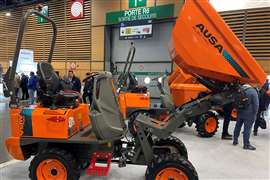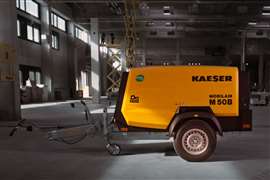The Appleton Column: Up the Amazon without a paddle
20 April 2016

It was estimated by the US based Centre for Retail Research that online retail sales, globally, grew by over 18% in 2015. This growth was achieved against the backdrop of a world economy growing at around 3.5% (source: IMF).
More personally, I struggle to remember the last time I actively made the decision to go shopping in a bricks and mortar retailer (as opposed to diving in somewhere because it was wet and I was early for a meeting).
So it seems clear, at a consumer level, that the internet is changing our patterns of purchasing forever. Amazon is only a little over twenty years old and now it has annual revenues of US$107 billion (€97 billion)!
It used to be the place you could buy cheap books. Now you can get everything from power tools to cosmetics, from clothing to timber. The obvious question then is, “when will this happen in rental?” Is there a rental Amazon, that may have only just started, that will be a global behemoth in twenty years’ time?
If we look at e-commerce in rental today we see a very mixed picture. The approaches to online rental basically break into four groups – the integrated onliners, the brokers, the multi-channelers and the walking dead.
Integrated onliners
The integrated onliners are those, very few, companies who have created a physical infrastructure (they own equipment and depots), but where their customer service interaction is +/- 100% online.
These are exclusively smaller companies (booking less than US$25 million, or €23 million, per year in revenues) and they are also largely US-based.
What's more, these companies also tend to deal in equipment which is well-known and understood by the user-base. In addition, these firms are able to run with lower overheads due to the absence of customer service agents.
These factors certainly give companies like this a cost advantage, and they may well also give them the basis for a very slick overall operation. In fact, this could be the sector from where the future rental Amazon company emerges.
Brokers
The brokers are becoming more and more common. These are more like travel websites which simply consolidate the offer of a number of operators and give the customer a clear price choice. They own no assets themselves and are living by taking a cut on the jobs they refer to the rental business.
They again have minimal overheads, but also no assets to pay for. Again there is an assumption that the customer knows what they are looking for.
Multi-channelers
The multi-channelers are those mainstream rental companies which have created an online ordering method for their equipment, but also still transact through stores or by phone.
They may offer advantageous pricing to online bookings as it helps them reduce their administration, but essentially they still carry the same cost structure as before. A key difference is that they are resourced to deal with the customer who isn’t sure, needs a little extra support or needs a super-fast or adapted service.
The walking dead
The walking dead are those companies hoping this is all going to go away. They haven’t been able to develop an online offer because they don’t have the skills, or maybe they can’t work out how to represent a negotiated price model online. These are generally the companies that brokers are tapping into as their source of cheap equipment and this, I fear, is likely to be their long term future – a few, declining long-term customers and a load of really cheap deals passed through from brokers. Eventually economics will kill off this part of the market.
Of course the thing with Amazon is that it doesn’t sell immensely complex products – ones that you’d like to touch, feel and understand (at least metaphorically) before you buy them. However, what Amazon does do is provide an amazingly efficient and effective integrated service at a very competitive price.
If technology advances to the stage where virtual site surveys or machine usage becomes a practical reality, then there are no barriers left to renting solely online. If this is backed up with excellent service then it will be even more irresistible.
This is a column from the April/May 2016 issue of IRN. To read the full article, with extra images and information, subscribe to the magazine: http://www.khl.com/subscriptions/magazines/international-rental-news/






